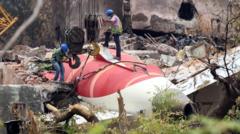Investigators have successfully retrieved the cockpit voice recorder (CVR) from the wreckage of the Air India flight that tragically crashed just seconds after departing from Ahmedabad. This significant recovery is essential in determining the reasons behind last week’s deadly incident, which resulted in a death toll of at least 270, predominantly passengers aboard the aircraft.
The ill-fated flight, a Boeing 787-8 Dreamliner, was on its way to London when it plummeted shortly after takeoff on Thursday. The CVR records various cockpit sounds, including exchanges among pilots, alarms, and other ambient noises that may help clarify the moments leading up to the crash. Additionally, the flight data recorder (FDR) was already located on Friday, capturing vital flight parameters such as speed, altitude, and engine metrics. Together, these recorders—these two bright orange devices known as the "black boxes"—serve as critical instruments in air crash investigations, assisting experts in reconstructing the final moments of the flight.
The inquiry is spearheaded by India’s Aircraft Accident Investigation Bureau (AAIB), and is being supplemented by teams from the United States and the United Kingdom. Officials from the U.S. National Transportation Safety Board (NTSB) have already made inspections at the crash site. A statement on Sunday indicated the dual inquiries—one from the AAIB and one from the NTSB—are adhering to international protocols due to the aircraft's American engineering.
Moreover, the Indian government has appointed a high-level committee tasked with investigating the crash. This committee's first meeting is scheduled for Monday, with a preliminary report expected within three months, including recommendations for new operational procedures to enhance future aviation safety.
As investigations progress, families of the victims, still in shock, are enduring overwhelming grief. Many are anxiously awaiting the retrieval of their loved ones’ remains; as of now, over 270 bodies have been found within the crash debris. The DNA matching process is slow but crucial, with more than 90 victims identified thus far; 47 of these identified bodies have been released to their families.
Among the deceased is Vijay Rupani, the former chief minister of Gujarat, who is to be honored in a state funeral on Monday. Family members continue to express their anguish over the extended identification process, compounded by the challenging tasks faced by officials in recovering remains from the site, where many victims suffered severe burns. The slow pace of confirming identities adds to the heart-wrenching ordeal experienced by those waiting outside the hospitals for news, like Mistry Jignesh, whose niece’s fate remains uncertain.
The nation mourns as the effects of this tragic incident are felt deeply across communities, highlighting an urgent need for thorough investigation and changes in safety protocols to prevent future calamities.



















